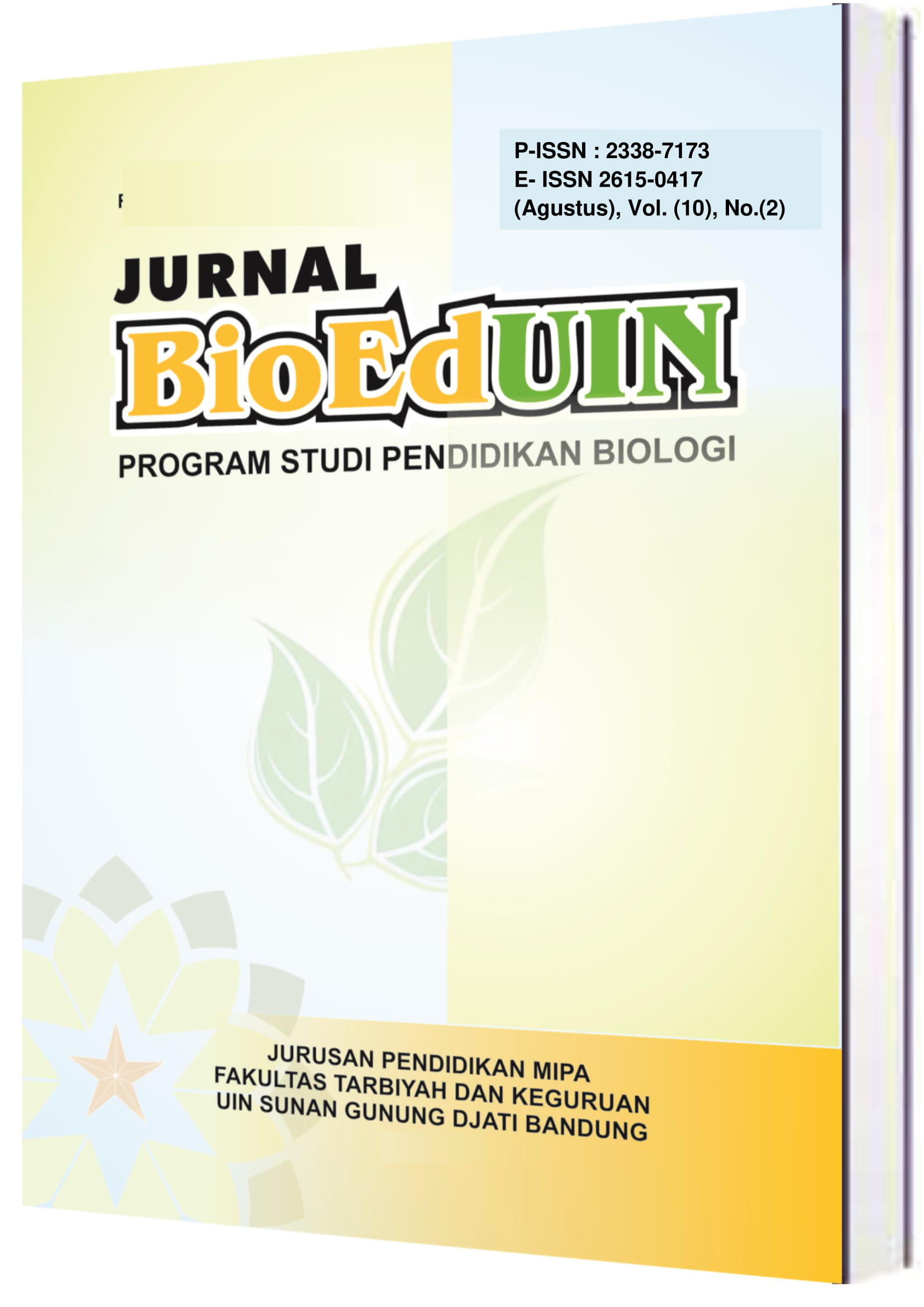PENGARUH PENGGUNAAN MEDIA PEMBELAJARAN MOBILE LEARNING BERBASIS SMARTPHONE TERHADAP MINAT BELAJAR SISWA SMA NEGERI 1 SERAM UTARA BARAT
DOI:
https://doi.org/10.15575/bioeduin.v10i2.12087Keywords:
Learning Media, Mobile Learning, Smartphones, Interest in LearningAbstract
students. In the communication process, sometimes experiencing obstacles so that an intermediary is needed in the
form of media that can bridge communication between teachers and students. The purpose of this study was to
determine the effect of the use of Smartphone-based Mobile Learning learning media on student interest in learning.
This research was conducted at SMA Negeri 1 Seram Utara Barat. The research method used is a quasi experiment.
The research design used was a quasi-experimental form of the nonequivalent control group design. From the
population data, two sample groups were taken, namely the experimental group and the control group. The
instruments used were questionnaire questionnaire and observation sheet. Data analysis used in this study includes
data normality test, homogeneity test, hypothesis testing. The results of students' interest in learning showed that the
average posttest score obtained by the experimental class was 80.73 and was greater than the average posttest score
for the control class which was 70.65. The results of testing the hypothesis can be done using the t-test to calculate
the effect of smartphone-based mobile learning on student learning interest. The effect of the based mobile learning
model shows that the calculated F value is 17,220 with a p value of 0,000 or less than 0.05 so that the null hypothesis
is rejected and the research hypothesis is accepted. These results can be interpreted that the based mobile learning
media has an effect on the learning outcomes of class students of SMA Negeri 1 Seram Utara Barat.
References
Alfi, A. F. (2001). Dasar Sistem Kendali
(Bahan Ajar. Jurusan Pendidikan
Teknik Elektro Fakultas Teknik UNY.
Ally, M. (2009). Mobile learning:
transforming the delivery of education and
training. AU Press.
Arif Budi Utomo, Upik Yelianti, Muswita,
E. J. W. (2018). Pengembangan E-Book
Berbasis Mobile Learning Pada Mata
Kuliah Struktur Tumbuhan.
BIOEDUKASI: Jurnal Pendidikan
Biologi, 11(2), 93–104
Arifin, Z. (2012). Penelitian Pendidikan
Metode dan Paradigma Baru. Rusda.
Azizah, I. F. dan S. (2012). Kontribusi Media
Interaktif pada Contextual Teaching
berorientasi Learning Community terhadap
hasil Belajar siswa. Jurnal Inovasi
Pendidikan Kimia, 6(1), 903-908.
Chandrasegaran, A. L., Treagust, D. F. dan
Mocerino, M. (2008). An Evaluation of
a Teaching Intervention to Promote
Students’ Ability to Use Multiple Levels
of Representation When Describing and
Explaining Chemical Reactionâ€s.
Research in Science Education, 38(2),
–248.
Hake, R. . (2004). Design-Based Research:
A Primer for Physics Education
Researchers. The American Journal of
Physics, 2(1).
Hirsh-Pasek, K., Zosh, J.M., Golinkoff,
R.M., Gray, J.H., Robb,M.B., dan
Kaufman, J. (2015). Putting Education
in â€Educational†apps: Lessons From
teh Science of Learning. Psychological
Science in the Public Interest, 16(1),
–34.
Istiyanto, J. E. (2013). Pemrograman
Smartphone Menggunakan SDK
Android dan Hacking Android. Graha
Ilmu.
Ipin, A. (2018). Konsep dan Aplikasi Mobile
Learning dalam Pembelajaran Biologi.
Jurnal Bio Educatio, 3(2), 01–09.
Ismawati, R., Saptorini, dan Wijayati, N.
(2013). Pengaruh Model Pembelajaran
Inkuiri Berstrategi React Terhadap
Hasil Belajar Kimia Siswa SMA Kelas
XI. Jurnal Inovasi Pendidikan Kimia,
(1), 1044–1050.
Kim, D., Rueckert, D., Kim, D.J., dan Seo,
D. (2013). Students’ preceptions and
experiences of mobile learning.
Language Learning Dan Technology,
(3), 5273.
Nurrokmah, I.E. dan Sunarto, W. (2013).
Pengaruh Penerapan Virtual Lab
Berbasis Inkuiri Terhadap Hasil Belajar
Siswa. Chemistry in Education, 2(1),
–208.
Prasetyo, Y.D., Yektyastuti, R., Solihah, M.,
Ikhsan, J. dan Sugiyarto, K. . (2015).
Pengaruh penggunaan media
pembelajaran kimia berbasis aplikasi
android terhadap peningkatan motivasi
siswa SMA. Seminar Nasional
Pendidikan Sains V.
Purbasari, R., Kahfi, M. dan Yunus, M. (2012).
Pengembangan Aplikasi Android sebagai
Media Pembelajaran Matematika pada
Materi Dimensi Tiga untuk Siswa SMA
Kelas X. Jurnal Pendidikan Matematika,
(2), 3–11.
Rochmani, S. (2011). Penggunaan Media
Gambar Untuk Meningkatkan
Prestasi Belajar Bahasa Mandarin
Siswa Kelas V Di SD Tripusaka
Surakarta.
Slameto. (2010). Belajar dan Faktor-Faktor
yang Mempengaruhinya. Rineka Cipta.
Wasti, S. (2013). Hubungan Minat Belajar
Dengan Hasil Belajar Mata Pelajaran
Tata Busana Di Madrasah Aliyah 2
Padang. Universitas Negeri Padang.
Valk, J.H., Rashid, A.T., dan Elder, L. (2010).
Using Mobile Phones to Improve
Educational Outcomes:An Analysis of
Evidence from Asia. International Review
of Research in Open and Distance
Learning, 11(1), 117-140.
Zamroni, M. (2009). Perkembangan
Teknologi Komunikasi dan Dampaknya
terhadap Kehidupan. Jurnal Dakwah,
(2), 202.
Downloads
Published
How to Cite
Issue
Section
Citation Check
License
Authors who publish in Jurnal BIOEDUIN agree to the following terms:
- Authors retain copyright and grant the journal right of first publication with the work simultaneously licensed under a Attribution-ShareAlike 4.0 International (CC BY-SA 4.0) License that allows others to share the work with an acknowledgment of the work's authorship and initial publication in this journal.
- Authors are able to enter into separate, additional contractual arrangements for the non-exclusive distribution of the journal's published version of the work (e.g., post it to an institutional repository or publish it in a book), with an acknowledgment of its initial publication in this journal.
- Authors are permitted and encouraged to post their work online (e.g., in institutional repositories or on their website) prior to and during the submission process, as it can lead to productive exchanges, as well as earlier and greater citation of published work (See The Effect of Open Access).









